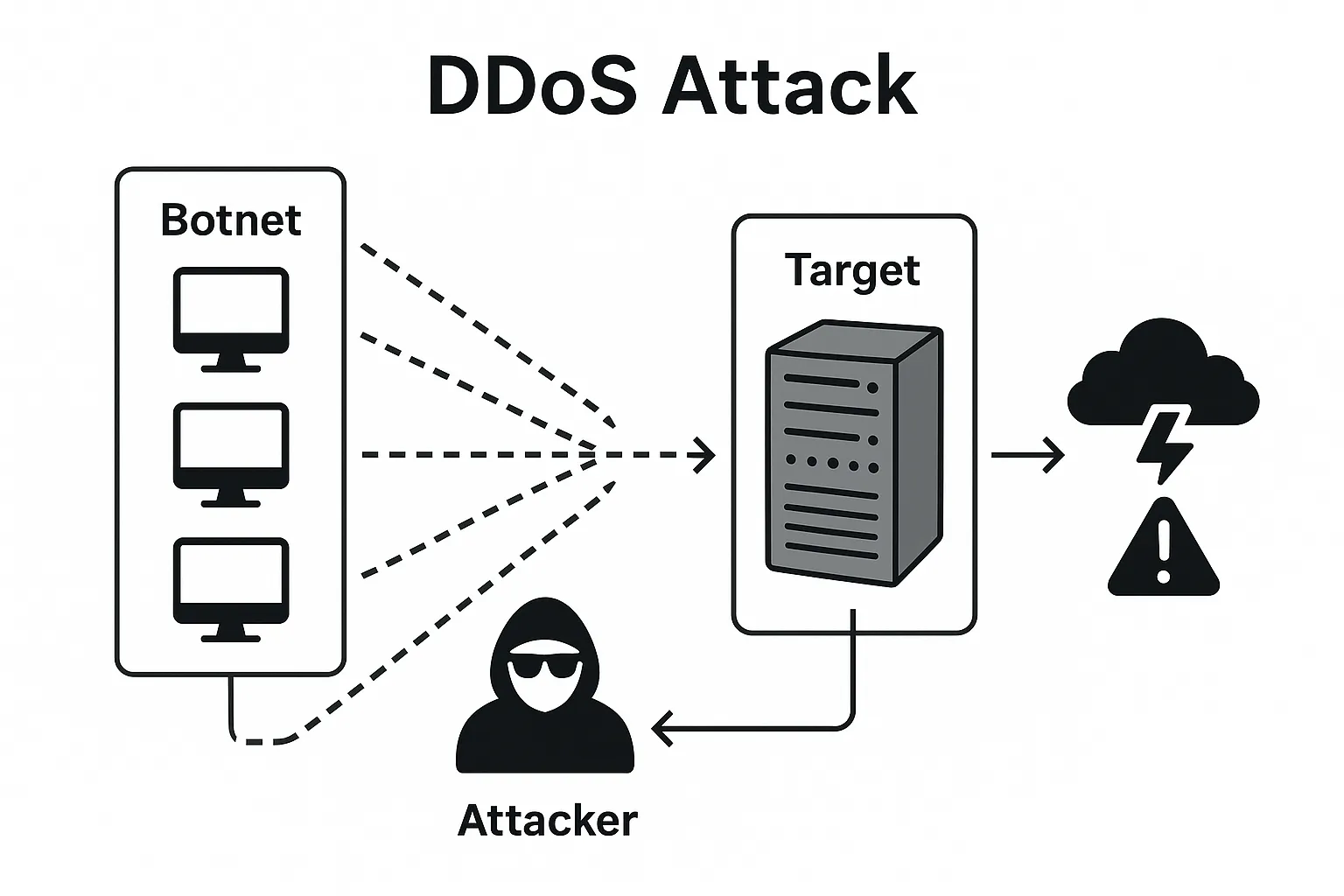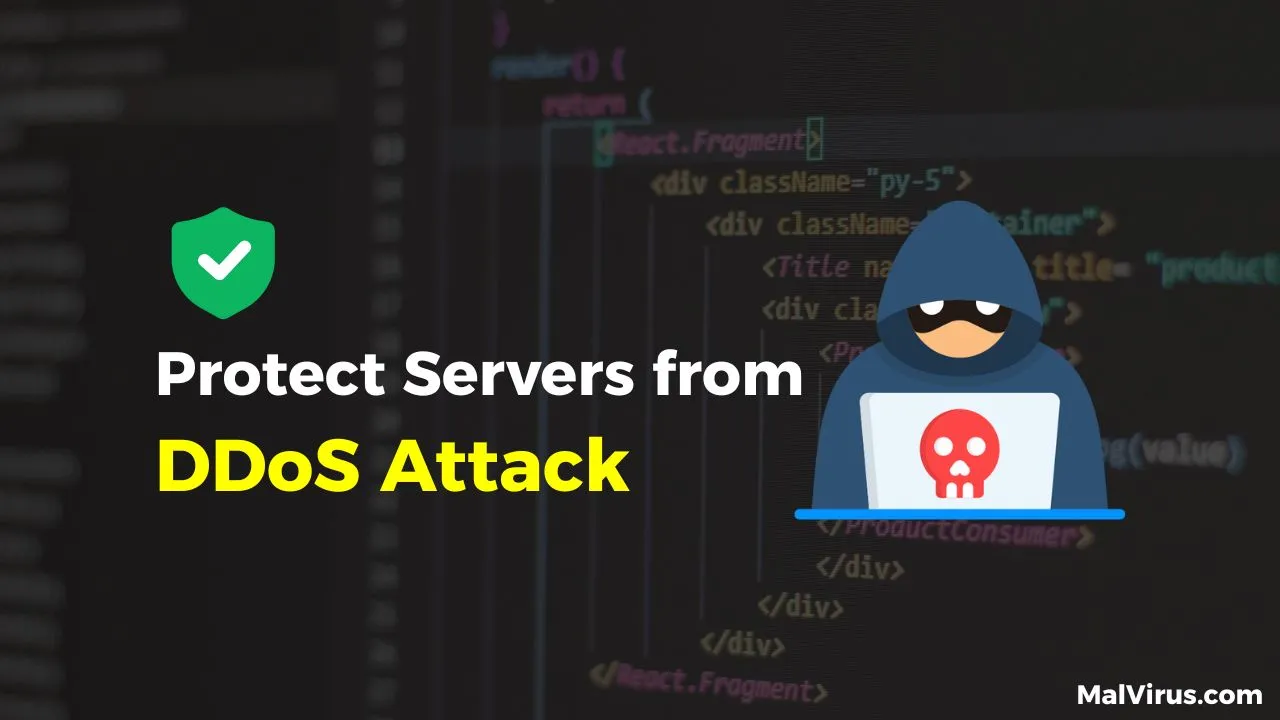How to Protect Server from DDoS Attack?
A Distributed Denial of Service (DDoS) attack can really hurt our online presence. It can cause big financial and reputation losses.
Web hosting is vital for our online work. So, protecting it from attacks is essential. We’ll look at ways to keep our servers safe, making sure our online services keep running smoothly.
Knowing how to protect against DDoS attacks is crucial. It helps us avoid service outages and keeps our users’ trust. We’ll talk about important methods and best practices for web hosting security.

Understanding DDoS Attacks
To fight DDoS attacks, we must first know how they work. DDoS attacks are a serious threat that can crash even the strongest server setups, like those in VPS hosting.
These attacks can cause a lot of downtime and hurt businesses. Knowing what DDoS attacks are is key to lessening their damage.
What is a DDoS Attack?
A DDoS (Distributed Denial of Service) attack happens when many systems flood a server’s bandwidth or resources. This makes the server too busy to handle real requests. It’s done by using a network of hacked computers (botnets) to send a huge amount of traffic to the target.
How DDoS Attacks Target Servers
DDoS attacks hit servers by finding weak spots in network protocols or by sending too much traffic. For VPS hosting, this means the server’s resources get used up. This can cause service outages or slow downs. Attackers might aim at specific services or the whole server setup.
| Server Configuration | Vulnerability to DDoS | Impact of DDoS Attack |
|---|---|---|
| Shared Hosting | High | Service outage, data loss |
| VPS Hosting | Medium | Resource depletion, slowdowns |
| Dedicated Hosting | Low | Potential service disruption, requires robust protection |
Common Types of DDoS Attacks
It’s important to know about different DDoS attacks to protect our online services. Each type needs a special way to fight back, like for VPS and web hosting services. These are often hit hard by such attacks.
Volume-Based Attacks
Volume-based attacks flood a server with too much traffic. This makes it hard for the server to handle real requests. To fight these, we use methods to block or absorb the extra traffic.
Protocol Attacks
Protocol attacks aim at the network and transport layers. They use weaknesses in TCP and UDP to harm servers. To stop these, we need strong network setups and tools like rate limiting.
Application Layer Attacks
Application layer attacks target specific apps or services. They look like normal traffic, making them hard to spot. For web hosting, these attacks can make sites go down. We use advanced detection techniques and filters to fight them.
In summary, knowing about DDoS attacks helps protect VPS and web hosting services. By understanding volume, protocol, and application layer attacks, we can strengthen our defenses.
Essential Preventive Measures Against DDoS Attacks
To protect your server from DDoS attacks, it’s key to use strong preventive steps. A good plan makes your server strong and keeps your services running, even when attacked.
Network Infrastructure Optimization
Improving your network is a big step in stopping DDoS attacks. You need to set up your network to handle lots of traffic. Also, make sure it can grow to meet demand.
We can do this by upgrading our network hardware and adding redundancy in our infrastructure. This way, we can spread out traffic and handle attacks better.
Traffic Filtering and Rate Limiting
Using traffic filters and rate limits helps fight DDoS attacks. These methods block bad traffic and control how much traffic we let in. This stops our servers from getting too busy.
We can set up firewalls and intrusion prevention systems to do this. They help tell good traffic from bad.
Implementing Web Application Firewalls
A Web Application Firewall (WAF) is a must-have for protecting web apps from attacks, like DDoS. It checks traffic at the application layer and blocks bad requests. This keeps our web apps safe and working.
Using Content Delivery Networks (CDNs)
Content Delivery Networks (CDNs) help fight DDoS attacks by spreading our content on many servers worldwide. By caching our content at edge locations, CDNs can take some of the traffic load off our main servers. This makes it harder for attackers to flood us with traffic.
Server Resource Scaling for VPS Hosting
For VPS hosting, it’s important to be able to scale server resources quickly. By scaling our VPS resources, like CPU, RAM, and bandwidth, we can keep our server running smoothly, even when it’s busy. This is crucial for VPS hosting, where we can adjust resources as needed.
| Preventive Measure | Description | Benefit |
|---|---|---|
| Network Infrastructure Optimization | Upgrading network hardware and implementing redundancy. | Enhanced resilience against DDoS attacks. |
| Traffic Filtering and Rate Limiting | Configuring firewalls and intrusion prevention systems. | Effective mitigation of malicious traffic. |
| Implementing Web Application Firewalls | Inspecting traffic at the application layer. | Protection against application-layer attacks. |
| Using Content Delivery Networks (CDNs) | Caching content at edge locations. | Absorbs traffic and reduces load on origin servers. |
| Server Resource Scaling for VPS Hosting | Scaling VPS resources according to demand. | Ensures server responsiveness under stress. |
By taking these steps, we can make our server much safer against DDoS attacks, even with VPS hosting. It’s about building a strong defense that can spot, absorb, and fight off attacks.
Advanced DDoS Protection Solutions for Web Hosting and VPS
The technique of DDoS attacks is always changing. This means we need better ways to protect web hosting and VPS. Advanced, multi-layered defense strategies are now essential.
Cloud-Based DDoS Protection Services
Cloud-based DDoS protection is a great solution. It can handle big traffic volumes and only lets real requests through. The main benefits are:
- Scalability: It can manage lots of traffic.
- Real-time Threat Detection: It spots and stops threats fast.
- Global Network: It uses a worldwide network to filter traffic.
Hardware Solutions for VPS and Dedicated Hosting
For VPS and dedicated hosting, hardware solutions are strong. They use special hardware to fight DDoS attacks at the source.
Key Features:
- It filters traffic fast and well.
- It has advanced threat detection.
- It lets you set up custom protection.
Specialized DDoS Mitigation Software
Special software is made to catch and block bad traffic. It works best with other protection tools.
- Traffic Analysis: It checks traffic for threats.
- Customizable Rules: You can set up rules for specific threats.
Managed Security Services for VPS Hosting
Managed security services for VPS hosting take a full approach to DDoS protection. They include always watching, finding threats, and stopping them.
Benefits:
- They have expert monitoring and response.
- They proactively stop threats.
- They follow security standards.
In summary, fighting DDoS attacks on web hosting and VPS needs a mix of solutions. Using cloud services, hardware, software, and managed services gives strong protection against DDoS threats.
Conclusion
Protecting your server from DDoS attacks needs a detailed plan. This plan should include many preventive steps and advanced protection tools. We’ve talked about the different types of DDoS attacks and how to keep your online services safe, focusing on VPS hosting.
To lower the risk of DDoS attacks, improve your network setup. Use traffic filtering and rate limiting. Also, content delivery networks (CDNs) can help a lot. Cloud-based DDoS protection services and special software add extra security to your VPS hosting.
DDoS attacks keep getting more complex. So, it’s important to stay alert and ready to defend. By using what we’ve discussed, you can keep your server safe. This way, your online services will keep running, even when faced with a DDoS attack.




